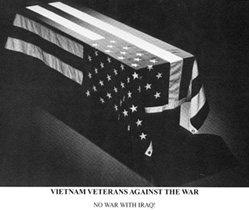The wisest were just the poor and simple people. They knew the war to be a misfortune, whereas those who were better off, and should have been able to see more clearly what the consequences would be, were beside themselves with joy (my emphasis).
Katczinsky said that was a result of their upbringing. It made them stupid. And what Kat said, he had thought about... (skip ahead).
While they continued to write and talk, we saw the wounded and the dying. While they taught that duty to one's country is the greatest thing, we already knew that death-throes are stronger. But for all that we were no mutineers, no deserters, no cowards -- they were very free with all these expressions. We loved our country as much as they; we went courageously into every action; but also we distinguished the false from the true, we had suddenly learned to see. And we saw that there was nothing of their world left. We were all at once terribly alone; and alone we must see it through.
"All Quiet on the Western Front," Erich Maria Remarque, excerpts from pages 15,16,& 17.
" ..those who were better off ..
were beside themselves with joy". Sounds like some folks I know. It sounds like some folks I know who claim to follow Christ. It sounds like some folks nowadays who thank their God and their Jesus for George W. Bu$h and his holy war. But max-nix. It was those at the front suffering in this WWI classic. It was those at the front that Wilfred Owen described in his poem,
Dulce et Decorum Est:
DULCE ET DECORUM EST
Bent double, like old beggars under sacks,
Knock-kneed, coughing like hags, we cursed through sludge,
Till on the haunting flares we turned our backs
And towards our distant rest began to trudge.
Men marched asleep. Many had lost their boots
But limped on, blood-shod. All went lame; all blind;
Drunk with fatigue; deaf even to the hoots
Of disappointed shells that dropped behind.
GAS! Gas! Quick, boys!-- An ecstasy of fumbling,
Fitting the clumsy helmets just in time;
But someone still was yelling out and stumbling
And floundering like a man in fire or lime.--
Dim, through the misty panes and thick green light
As under a green sea, I saw him drowning.
In all my dreams, before my helpless sight,
He plunges at me, guttering, choking, drowning.
If in some smothering dreams you too could pace
Behind the wagon that we flung him in,
And watch the white eyes writhing in his face,
His hanging face, like a devil's sick of sin;
If you could hear, at every jolt, the blood
Come gargling from the froth-corrupted lungs,
Obscene as cancer, bitter as the cud
Of vile, incurable sores on innocent tongues,--
My friend, you would not tell with such high zest
To children ardent for some desperate glory,
The old Lie: Dulce et decorum est
Pro patria mori.
Wilfred Owen
DULCE ET DECORUM EST - the first words of a Latin saying (taken from an ode by Horace). The words were widely understood and often quoted at the start of the First World War. They mean "It is sweet and right." The full saying ends the poem: Dulce et decorum est pro patria mori - it is sweet and right to die for your country.
